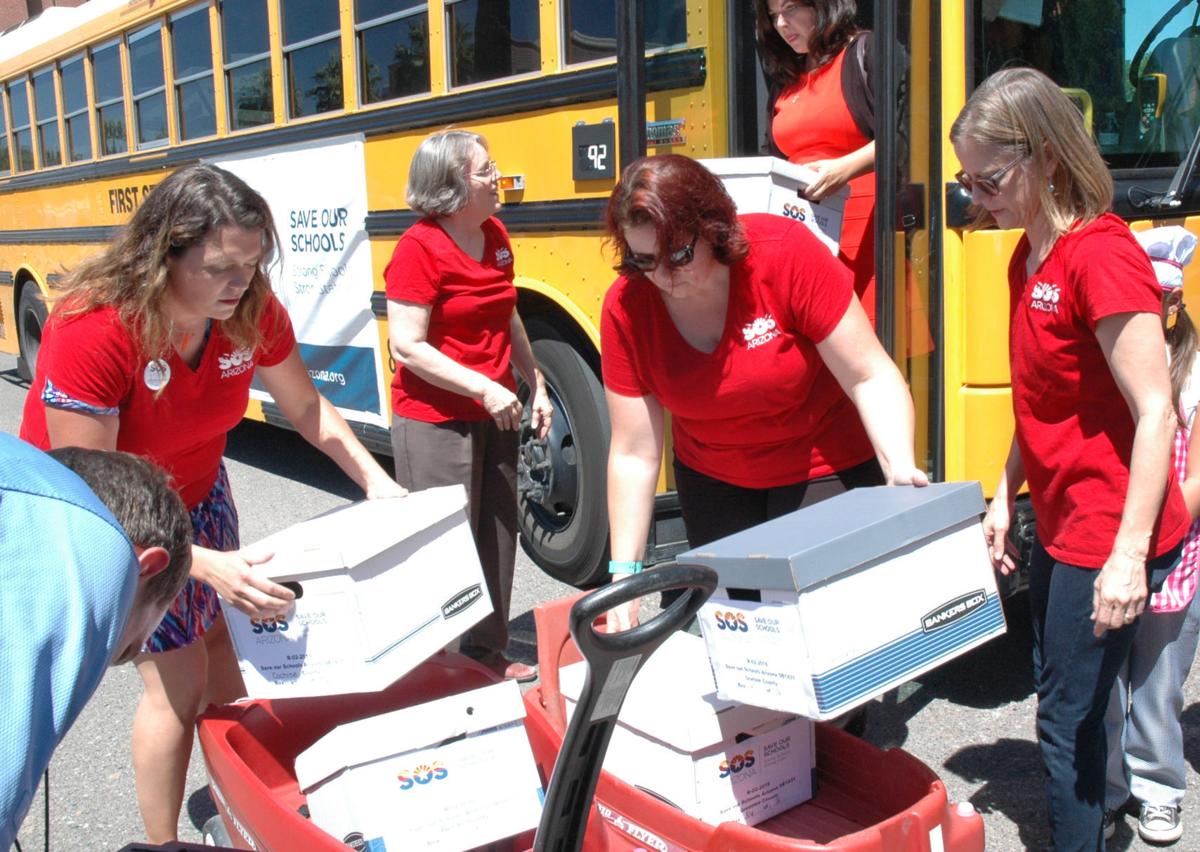PHOENIX — Advocates of universal school vouchers are already moving to disqualify some petitions turned in less than 24 hours earlier to force a public vote on the issue.
In a letter Wednesday to state election officials, Tim LaSota, attorney for the voucher supporters, claims some petition circulators did not list a proper address where they could be served with legal papers if necessary. Separately, he says some signature sheets came in without the required, attached text of the measure that would be referred to the ballot.
In both cases, LaSota contends those petitions are disqualified. Any such finding by election officials would chip away at what could be a narrow margin of signatures needed by voucher foes to put the issue to voters.
A day earlier, a committee called Save Our Schools, which is opposed to universal vouchers, submitted petitions with more than 111,000 names calling for a public vote on legislation that would allow any Arizona child to get a voucher of state dollars to attend private or parochial schools.
The committee needs 75,321 of the signatures to be found valid to put the issue on the November 2018 ballot.
But it is not unusual for up to 30 percent of signatures to be found invalid. If LaSota is successful at having entire petition sheets tossed, it decreases the chances that the referendum drive will be successful.
Voucher foes are already fighting back against the disqualification attempts.
Their attorney, Roopali Desai, in her own letter to Elections Director Eric Spencer, said LaSota is legally off base with his first claim. She said the three circulators whose petitions were questioned were clearly registered to vote, which is the only issue for the secretary of state to address.
As to the argument about petitions detached from the referendum language, Desai said that is based on claims made by voucher supporters who were allowed to watch state employees process the petitions after they were submitted.
She said it is up to those observers to identify specific sheets, something LaSota’s complaint does not do. Desai said it would be “inappropriate” for election officials to disqualify petition sheets “based on Mr. LaSota’s speculation about whether the title and text was attached to a particular sheet” at the time someone signed it.
“Each sheet contains an affidavit stating under oath that it was,” Desai told Spencer. “And if Mr. LaSota and his client have a good faith basis to challenge that affidavit, their remedy is in court.”
Desai contends Spencer made a “highly suspicious” and apparently unprecedented decision to allow outsiders in the room with state employees during petition processing.
She acknowledged that policy also permits people from her own committee to keep an eye on things. But she expressed concern that the new policy, rolled out without notice and without formal rules, had the effect of letting voucher supporters intimidate state workers by standing over their shoulders and making comments.
Desai said it appeared state staffers were alerting pro-voucher observers to “potentially problematic petitions” for them to photograph.
Matt Roberts, spokesman for Secretary of State Michele Reagan, acknowledged that some comments were made by observers to staffers early on. But he said they came from both sides and were halted within minutes.
Many of the observers were from the American Federation for Children, a pro-voucher group. Group spokeswoman Kim Martinez called their activities “all part of the process.”
“We’re in our rights to be here,” Martinez said. “We are not intimidating anybody. We have been nothing but friendly and just making sure that the process goes correctly.”
Spencer defended the change in procedures. He said he made it because of the level of interest in the issue, as well as the fact that the number of signatures submitted would likely make the outcome of the count very close.
He denied it was done because the foes of the referendum — the people who want an expanded voucher program — are Republicans like he and his boss, Reagan.
Desai disagreed, pointing out that LaSota and fellow attorney Kory Langhofer, another supporter of vouchers, already had observers at the ready just hours after she was told of the new procedure. That shows the other side knew “well in advance,” she argued.
Hanging in the balance is the future of SB 1431.
Until now, the vouchers — technically called “Empowerment Scholarship Accounts” — were available only to students in special categories, such as those with disabilities, in foster families, living on reservations or attending schools rated D or F. About 3,500 students now get the vouchers.
SB 1431 removes all such requirements, though it caps the total number of vouchers available at 30,000 by 2023 — or until lawmakers vote to remove the cap.





